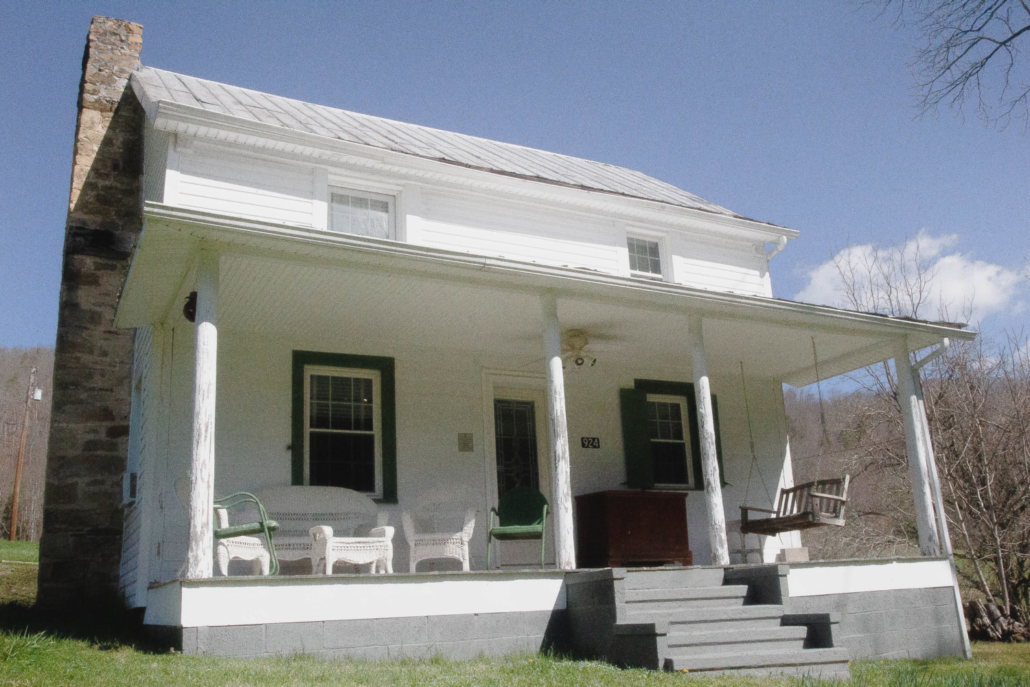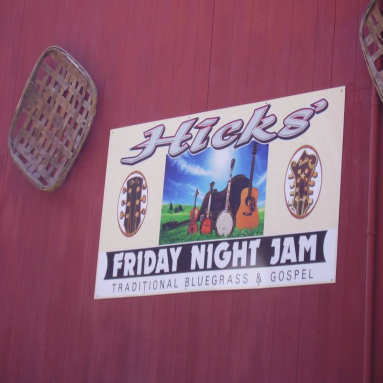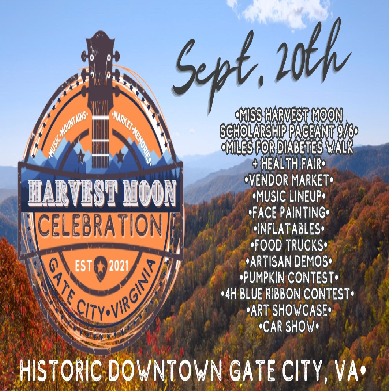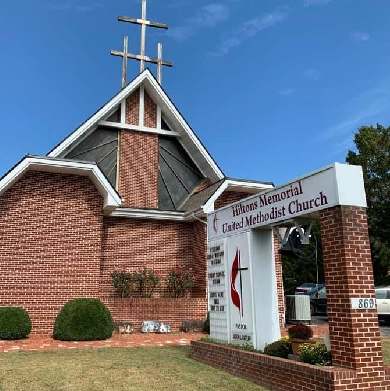
Listed on the National Register of Historic Places, the Fulkerson-Hilton Home in the Hiltons community of Scott County, Virginia, is now available for rental through Airbnb.
Nearby residents to the historic home, Jeff and Rebecca Arrington, purchased the home and its surrounding property about two years ago to carry on the tradition of preserving the historic landmark and to share it with others through the Airbnb community. Jeff is an service architect for Eastman Chemical Company in neighboring Kingsport, Tennessee, and Rebecca is a social worker by training and now works in admissions and marketing at Nova in Weber City, Virginia.
When the Arringtons purchased the home, they wanted to maintain the historical integrity but, at the same time, provide modern conveniences for a more comfortable stay for their guests. The Arringtons accomplished the melding of the old and new perfectly.
Upon entering the two-story home, you are embraced by the past with the exposed oak, poplar and pine beams with half-dovetail notching. Centered in the front room is a large hand-chiseled stone fireplace complete with a hand-forged cooking crane. The beautiful arched fireplace features a tall, deep, and slightly trapezoidal firebox. A modern, comfy and overstuffed couch and loveseat arrangement beckon visitors to come and sit a spell in front of the fire.
Around the room, the Arringtons have placed various antique pieces, many of which are original to the house or the property, including an upright piano.
The main front room and a small bedroom to the right, and a large upstairs with two additional large bedrooms are original to the farmhouse. The bedroom to the right of the main room contains a bunkbed, covered with a homey quilt and complete with a wooden child’s rocking horse in the corner.
To access the second floor, guests enter an enclosed staircase from the main parlor. The angle of ascent is steep, and the steps are narrow winders, which means the steps are shaped like wedges of a pie that pivot around a square post. The enclosed staircase is supported by the vertical-beaded pine board, which has no studs, in the main parlor.
The upstairs bedrooms transport visitors back to an earlier time. The loft features twin beds and an antique cradle and a beautiful secretary displayed with antique spectacles, an ink well and quill for writing, and an old pocket watch. The adjoining bedroom has a queen bed, also covered with a homey quilt. Antique complements to the room include an old spinning wheel, storage chest and rocking chair. Walls in the upstairs also showcase the home’s original log construction.
According to records used for the historical documentation on the National Register of Historic Homes, an addition was added to the log cabin around 1949. This addition included an updated kitchen, dining room and bathroom.
The Arringtons are using the dining room as another guest bedroom, which features an oak bed and small secretary desk. Adjacent to this room is the kitchen, which is stocked with water and snacks for guests when they arrive. Jeff explains, “no one wants to go to the grocery store just as soon as they arrive.”
Between this addition and the log structure is the original door from the time of construction. Significant to this door is the “nail pattern” on the doorway, which Jeff explains was the “signature of the carpenters who worked on the original house.”
While the home has been lovingly preserved in every aspect by the Arringtons, its true focal point is the massive chimney centered on the western wall of the house. Comprised of hand-chiseled stones, many of the stones exceed four feet in length, one foot in width and ten inches in thickness. According to the historical documentation, sandstone this size was not found in the Little Valley of Hiltons. Local sandstone consists primarily of limestone and shale. The document speculates the stones must have come from the Clinch Mountain, which is composed primarily of sandstone and lies approximately one mile to the north.
History of the House
While the home itself is a monument to history, the story of the families who lived here is just as fascinating. In 1782 Abraham Fulkerson purchased three parcels of land totaling 879 acres lying in Little Valley on the South Side of Poor Valley on the waters of the North Fork of the Holston. He was born to Dutch Reformed parents in Somerset County, New Jersey, in 1739, and later moved with his parents to North Carolina. Here he purchased land and married Sarah Gibson in 1766.
During the American Revolution, Fulkerson fought under the command of Col. William Campbell at the Battle of Kings Mountain on Oct. 1, 1780, where British troops suffered a decisive defeat. Following his time in service, he then moved to Little Valley in what today is Scott County.
By 1794, Fulkerson was joined by other settlers on the Holston River near Big Moccasin Gap. Fulkerson and his neighbors were subject to Indian raids, led by Chief Bob Benge, a half-breed Cherokee Indian. Benge and his band of marauders were notorious around the Big Moccasin area. At one point, Fulkerson and his neighbors sent a letter to the Governor seeking help in driving back Benge whose raids from 1791 to 1794 resulted in the deaths of at least 20 frontier settlers on the Holston.
Historical documents stated that at one point, Benge had his eye on the Fulkerson homestead. On that particular evening though, Fulkerson and his neighbors were engaged in a barn raising. Due to the large number of families gathered at the Fulkerson’s, Benge and his group bypassed the homestead.
Once the Indian raids ceased on the Virginia frontier after 1794, Fulkerson was able to develop his property on the North Fork of the Holston. He was able to shift from frontier subsistence to the processing of agricultural produce and created Fulkerson’s Mill and Mill House. In 1811, Fulkerson sold the property to the Hickam family, who then sold it again in 1816 to the Rev. Samuel Hilton, and wife, Nancy.
By this time, the property was now part of Scott County, Virginia, which was officially established in 1814. Fulkerson was one of the first Scott County commissioners.
As a man of the cloth, Hilton established two churches during his lifetime—the Double Springs Church on the Holston River and the United Baptist Church at Big Moccasin Gap, which was the first church built in Scott County. Samuel Hilton, along with his son, John, acquired extensive land holdings on the North Fork of the Holston River where it joined Little Valley.
Fulkerson’s daughter, Nancy, married John Hilton, and upon the death of Samuel Hilton, the Fulkerson home went back into possession of the Nancy Fulkerson Hilton. For the next several generations, the home would remain in possession of their heirs.
Several members of the Fulkerson and Hilton families are buried on the property, and include Abraham Fulkerson, Sarah Gibson Fulkerson, Rev. Samuel Hilton, Nancy Short Hilton and Fredrick Hilton. Abraham Fulkerson’s service to his country in the Battle of King’s Mountain was recognized by the Sons of the American Revolution with a burial marker commemorating his service at his grave on the Fulkerson-Hilton property.
For Jeff and Rebecca, restoration of the home has been a “labor of love.” They wanted to share the history of the home and this region with their guests. “I felt it was part of my responsibility to preserve this history for future generations.”
Visitors to the home have full access to the property, plus bicycles and kayaks for personal use. Upon request, Jeff can arrange fishing trips on both the Holston and Watauga Rivers. He can even provide guests with a blacksmithing experience at The Franklin Forge in Jonesborough.
To book your stay in this historic home click here.





